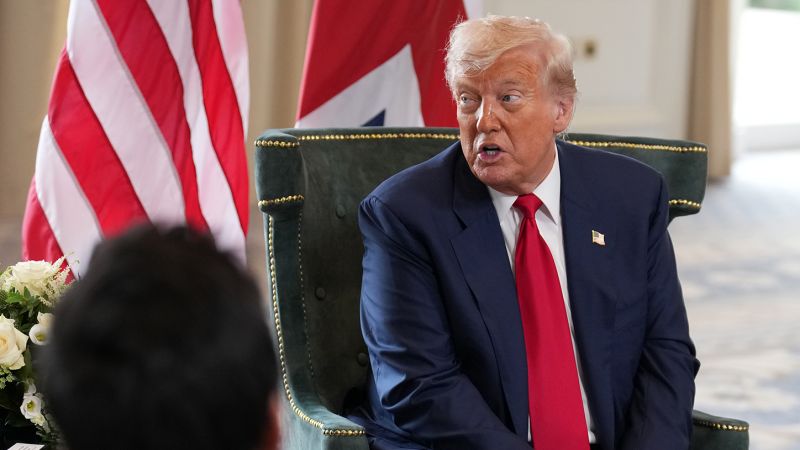The Jeffrey Epstein scandal continues to cast a long shadow over President Donald Trump, compelling him to clarify his associations with the convicted sex offender during a recent international trip. In a press conference held alongside British Prime Minister Keir Starmer, Trump strived to delineate his ties to Epstein, asserting he never engaged in inappropriate behavior nor visited Epstein’s notorious Caribbean island, which has become synonymous with debauchery.
During the bilateral meeting in the United Kingdom, Trump faced pointed inquiries regarding his past connections with Epstein. Contradicting claims made by various media outlets, he insisted he never penned an explicit birthday letter featuring sketches intended to be provocative, nor did he partake in activities that suggested he condoned Epstein’s notorious behavior. Trump recounted a former falling out, attributing the split to an “inappropriate” business dispute, which he claims unfolded well before Epstein’s criminal charges garnered worldwide attention.
The gravity of the Epstein affair poses unique challenges for Trump and officials within his administration, revealing their irritation with the media narrative that casts doubt upon Trump’s integrity. According to senior aides, he is annoyed that discussions around Epstein perpetuate an unflattering narrative that he has somehow implicated himself within Epstein’s criminality. Just a few weeks prior, the Justice Department had facilitated the release of a memo asserting Epstein’s death was self-inflicted and dismissing any speculative connections involving a supposed “client list” of his associates, further inflaming the conversation around Trump and Epstein.
In an attempt to ward off speculative commentary and groundless accusations, White House Communications Director Steven Cheung has been issuing steadfast rebuttals to claims that link Trump and Epstein through illicit activities. Despite acknowledging their past friendship, officials emphasize that there’s no credible evidence suggesting Trump participated in wrongdoing, nor has he ever been implicated alongside Epstein’s crimes. Cheung, in particular, has branded these reports as “fake news,” aiming to quell the ongoing media frenzy.
Trump’s narrative surrounding Epstein has evolved over time. Previously refraining from discussing the intricacies of their relationship, he has now taken a more assertive stance—the press conference signified a departure from his typical avoidance. Trump delineated instances in which he felt compelled to distance himself from Epstein after disapproving behavior. He recollected an uncomfortable episode where Epstein’s conduct crossed the line, leading him to declare Epstein “persona non grata,” reinforcing his contention that he actively sought to separate from Epstein.
Notably, Trump also contested reports regarding a purported sketch included in a birthday letter to Epstein that was reported by the Wall Street Journal. He dismissively stated, “I don’t do drawings,” refuting any implication of artistic involvement or impropriety in their correspondence. His public insistence stems from a deep desire to refute the insinuations connecting him to Epstein’s sordid history.
Additionally, Trump maintains he never accepted invitations to Epstein’s private island, asserting, “I didn’t want to go to his island.” However, the underlying concern remains—scrutiny surrounding past associations continues to linger, demanding Trump’s focus in a climate fraught with speculation.
Despite Trump’s personal insistence that he had no involvement with Epstein, the former ties necessitate continuous attention as both media narratives and political opponents leverage them for their own purposes. Members of his administration, including Vice President JD Vance, have sought to redirect criticism towards previous administrations that have failed to adequately address Epstein’s criminality over the decades. They argue that this historical leniency from former leaders warrants accountability.
The conversations surrounding Epstein are interwoven within the broader narrative of Trump’s administration and serve as a reminder of the complexities with which high-profile political figures grapple. As Trump endeavors to shift the national discourse back toward vital policy issues, such as trade agreements, he grapples with past connections that resourcefully detract attention from his larger agenda.











